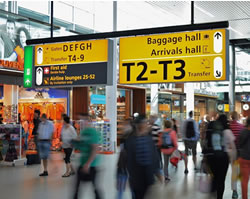Loretta Florance* says the issue of accessing a refund for cancelled travel plans is complicated.
 If you’re struggling to get a refund for a trip you planned and paid for before coronavirus restrictions came into place, you’re not alone.
If you’re struggling to get a refund for a trip you planned and paid for before coronavirus restrictions came into place, you’re not alone.
More than 6,000 people have contacted the Australian Competition and Consumer Commission (ACCC) to complain about travel companies since the pandemic began.
Some of the most common problems include travel companies:
- Offering credits but not refunds.
- Offering refunds, but only if you pay hefty cancellation fees.
- Changing their terms and conditions.
So, what are your rights and how can you exercise them?
Am I entitled to a refund?
Unfortunately, there is no easy answer to this.
In normal times, if you don’t get what you paid for, you’re generally entitled to a refund or a credit.
However, because this event is out of your travel company’s control, that general guarantee might not apply.
So, the first thing you need to do is check the terms and conditions (T&Cs).
The ACCC has clearly said if the T&Cs say you have a right to a refund, you still do.
However, T&Cs might also contain a force majeure clause, which exempts the company from their obligations in the case of a major disaster.
The Consumer Action Law Centre’s Gerard Brody said even if your contract has this clause, you might still be entitled to a refund.
“Consumers should know that those clauses are narrowly interpreted by the law and may only be valid if they specifically mention a pandemic,” Mr Brody said.
If not, you might be entitled to a refund under “frustrated contract” laws.
“If a service provider has cancelled a trip or a tour or a ticket and they can no longer supply it … that contract really has been frustrated because of the pandemic and you are entitled to a refund,” Mr Brody said.
Talk to the company
Ask for what you believe you’re entitled to, and what you think is reasonable.
The Consumer Action Law Centre recommends:
- Getting everything you can in writing; put your complaints in an email.
- Taking detailed notes of any phone calls, including the date and time they occurred.
- Asking to speak to a manager.
- Taking your complaint to social media.
Choice’s Jodi Bell says complaining on the company’s social media is worth trying, though it might not be as effective as usual, given the situation.
One company under particular scrutiny for its handling of coronavirus is Flight Centre, who until recently was charging $300 per person in cancellation fees for a refund.
Flight Centre was, however, offering customers credit.
It has since capped those fees at $600 per group for international travellers and $100 per group for domestic travellers.
Steven Hession is the creator of a Facebook group putting pressure on the company to do better.
The group has had former Flight Centre staff answering questions consumers might have.
“A lot of times when you’re just an individual and you’re trying to argue with a corporation, you feel like you’re very small in the big pond, so it just provided a place where people could find a bit of support,” Mr Hession said.
Get in touch with a consumer body
The ACCC can’t negotiate your case, but they can apply pressure to companies flouting the rules — so they need to hear from consumers who aren’t being treated fairly.
The ACCC has the power to take legal action resulting in large fines.
“[Companies] know in the background that’s the power we have, so we’ve been engaging with companies and airlines and got a lot of changes to their policies to conform with the law,” said ACCC CEO, Dr Rod Sims.
You can also contact local consumer bodies to get advice relevant to your State or Territory.
Travel insurance
If you have insurance, check your policy closely and call your provider to see what it will cover.
If your travel provider is refusing to give you a refund if you cancel, you might be able to get the money back through insurance.
Did you pay for your travel with a credit card?
If you paid with a credit card and didn’t get what you paid for, you can try asking your bank for a credit card chargeback.
Let the travel company know that’s what you intend to do.
“Essentially [the bank will] just come and take the money out of their account, so that’s not good for them,” Mr Bell said.
“So often that threat is enough.”
“If they think they are being reasonable then your bank becomes the arbiter and they have to decide whether to process it or not.”
What happens if the airline or tour company goes under?
One of the biggest complaints from consumers is that companies are offering credit, rather than refunds — but what happens if the company doesn’t survive the pandemic?
If a company becomes insolvent, consumers are considered unsecured creditors and will be low on the list of priority creditors.
Mr Bell said a recent Choice investigation into insurance policies and insolvency did not find a single policy in Australia that covered travel agency insolvency.
If you paid with a credit card, your bank might be able to help.
“If you process a chargeback [because] the company has gone insolvent, your bank will go and claim it off their bank,” Mr Bell said.
Taking your travel company to court
If negotiations with your providers are at a stalemate, your State’s small claims tribunal may be the best avenue for challenging it.
Under personal distancing restrictions, small claims tribunals are running limited operations, so this might not be a speedy process.
There is also a fee, but you represent yourself and will get an independent legal decision on your case.
Join a class action
Class action involves mounting a legal case against a company on behalf of seven or more people who have been similarly wronged.
You need to find a legal firm to represent you, and one person with a strong case to be the lead plaintiff.
Last month, the High Court ruled in favour of a group of travellers who received compensation for their disappointment after their European river cruise was replaced with a bus tour in 2013.
Be patient
Lastly and frustratingly, be patient.
If you can’t work this out with your travel company, it’s probably going to take a long time to get a resolution.
* Loretta Florance is a producer on the ABC’s Specialist Reporting Team.
This article first appeared at www.abc.net.au











